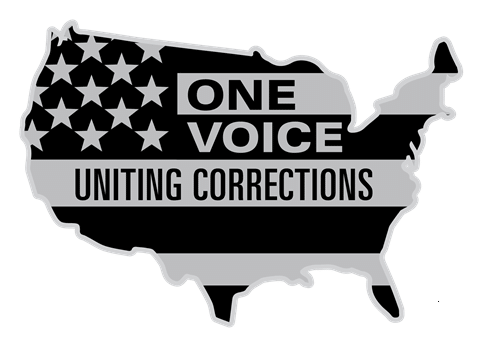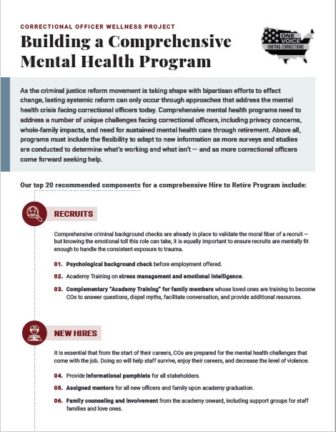As the criminal justice reform movement is taking shape with bipartisan efforts to effect change, lasting systemic reform can only occur through approaches that address the mental health crisis facing correctional officers today. Comprehensive mental health programs need to address a number of unique challenges facing correctional officers, including privacy concerns, whole-family impacts, and need for sustained mental health care through retirement. Above all, programs must include the flexibility to adapt to new information as more surveys and studies are conducted to determine what’s working and what isn’t — and as more correctional officers come forward seeking help.
Our top 20 recommended components for a comprehensive Hire to Retire Program include:
Recruits
Comprehensive criminal background checks are already in place to validate the moral fiber of a recruit — but knowing the emotional toll this role can take, it is equally important to ensure recruits are mentally fit enough to handle the consistent exposure to trauma.
- Psychological background check before employment offered.
- Academy Training on stress management and emotional intelligence.
- Complementary “Academy Training” for family members whose loved ones are training to become COs to answer questions, dispel myths, facilitate conversation, and provide additional resources.
New Hires
It is essential that from the start of their careers, COs are prepared for the mental health challenges that come with the job. Doing so will help staff survive, enjoy their careers, and decrease the level of violence.
- Provide informational pamphlets for all stakeholders.
- Assigned mentors for all new officers and family upon academy graduation.
- Family counseling and involvement from the academy onward, including support groups for staff families and loved ones.
Long-Term Employees
One of the biggest obstacles to officers and staff seeking help is the fear of exposure. This will remain a constant until mental health injuries are treated as any other in corrections, so many annual steps should be taken to normalize mental health assistance.
- Development of Employee Assistance Programs and Critical Incident Response Teams.
- Annual mandatory stress awareness and reduction training for management and staff.
- Annual anonymous employee surveys on stress and job conditions.
- Training on dealing with staff bullying, rumor-mongering and negative attitudes.
- Raw-number data collection to evaluate program success or weakness.
- Quality of Life (QOL) opportunities that may help alleviate mandatory overtime and allow staff time off for family events or medical emergencies.
- Team-building events and employee recognition programs.
- Community engagement to improve staff morale and educate the public.
- Confidential third-party counseling.
- Confidential placement for substance abuse issues with third-party providers.
- Leadership training for all DOC administrators and ranking officers.
Retirees
The most underserved, unrecognized, and endangered among us, our retirees have been literally left out in the cold. There are few, if any, programs offered by prison administrations designed to help retirees’ transition into a happy, healthy and much deserved retirement.
- Pre-retirement counseling and planning before retirement.
- Separation From Service exit interview for all retiring and vested employees.
- Confidential counseling available throughout retirement.


No comment yet, add your voice below!